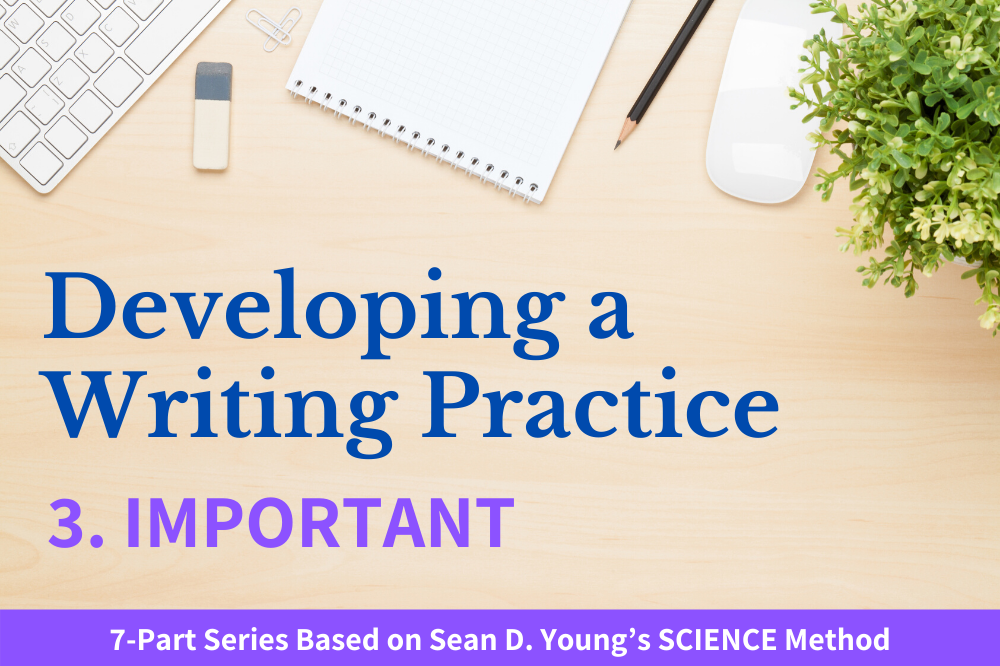
Today’s post is by regular contributor Susan DeFreitas (@manzanitafire), an award-winning author, editor, and book coach. She offers a first 50-page review on works in progress for novelists seeking direction on their next step toward publishing.
In part three of this series based on Sean D. Young’s bestselling book Stick with It: A Scientifically Proven Process for Changing Your Life—for Good, we’re taking a look at the I in SCIENCE, Young’s acronym for those strategies that lead to lasting change: Important.
The world is full of people who “want to write a book someday,” but few are those who manage to find the time to do so amid the myriad other commitments in their lives. What makes those people different?
In Chapter 4 of his book, Young shares the story of Suzette, a real estate agent with a busy full-time practice who nonetheless manages to find the time to write a blog on the topic of prescription drug abuse, and to lobby politicians to pass legislation that makes it harder for prescription drugs to fall into the wrong hands. She’s even working on a book about it.
How does Suzette manage to find the time to do all that? She finds the time because her son died of an opioid overdose. For her, the issue of prescription drug abuse is important.
A lot of the people who genuinely want to write a book never do so, because they never find a reason to prioritize their writing practice. That was the case with one of my book-coaching clients—until one of his sons died from cancer.
Knowing his father’s lifelong dream of being an author, his son told him before he passed, “Dad, write that book.” Ever since then, writing has been a priority for this client.
I was honored that my client trusted me with such a deeply personal story. And so I shared one in turn that’s deeply personal for me: when I was diagnosed with cancer at the age of 38, I realized there were just a few things I was really upset about, and one of them was not having published a book.
I mean, this was a lifelong dream of mine. How could I have failed to prioritize it? I decided right then and there that I would—and happily, I lived to tell the tale. (Literally! My first novel was published in 2016; in 2021, an anthology I’ve edited will join it on my bookshelf.)
But if writing and publishing a book is on your “bucket list,” there’s no need to wait until life reminds you of your mortality. You can make writing a priority right now.
Consider the following strategies for reminding yourself just how important writing is to you, and using that awareness to galvanize your practice:
1. Vision Board
A vision board is a strategy many writers use to bring themselves deeper into the world of their story, but it can also serve another purpose, by reminding you how much time and energy you’ve already dedicated to the task of envisioning, planning, and developing your book.
If that project weren’t important, you wouldn’t have done that, would you?
A vision board sends a clear signal: This project is a priority.
2. Heroes
One way to remind yourself of just how important writing is to you is to surround yourself with reminders of who your heroes are and what their work means to you. Maybe you pin a quote from a favorite writer on your fridge, or affix a photograph of a beloved author to the wall by your desk (I love this series of photos taken of famous authors in their writing spaces).
The author Tayari Jones went even further, by making a pilgrimage to Lorain, Ohio, the birthplace of her literary hero, Toni Morrison, and collecting a sample of dirt there—because to her, this author’s birthplace is literally hallowed ground. That dirt sits in a jar on her writing desk as a reminder of just how much Morrison means to her.
3. Write First Thing
Another way to send the message to yourself that writing is important is simply to make it the first thing you do in the morning, before checking email or social media.
This practice coincides with the advice of many productivity experts, who advise us to do “one high-value thing” each morning before going online, and it’s something I recommend to all of my coaching clients—not only because it tends to be a big help in developing a regular writing practice, but also because it’s a good mental health practice in general, especially in times of uncertainty and unrest in the world at large (like, say, a global pandemic).
Different strategies will work for different people. For some, spending the money required to work with a book coach or editor is what makes writing feel important (because who wants to waste their hard-earned cash?). For others, it’s the social contract of a critique group that does the trick.
Whatever does it for you, remember: No matter how busy our lives are, we find the time for what’s important to us. Finding ways to remind yourself of your commitment to writing, and moreover, why it matters to you, can do a lot to help you find that time, and establish a regular practice.

Susan DeFreitas is the author of the novel Hot Season, which won a Gold IPPY Award, and the editor of Dispatches from Anarres: Tales in Tribute to Ursula K. Le Guin, a finalist for the Foreword INDIES. An independent editor and book coach, she specializes in helping writers from historically marginalized backgrounds, and those writing socially engaged fiction, break through into publishing.

Interesting article. I like the idea of a vision board, I can see it being useful outside of writing, too. Do you have any recommended strategies or maybe applications for creating and managing them? Or do you just use an Excel spreadsheet?
I know some folks use the capabilities of Scrivener for these purposes, but I’ve always been fond of a good old fashioned bulletin board/magnetic board covered in visual images–pictures that remind you of your WIP, maps, research, inspiring quotes, etc.
Thank you for another wonderful part of this series. Being a women’s fiction and contemporary romance writer, a part-time librarian and homeschooling mom time is very precious to me. My busy day schedule swallows my time like you wouldn’t imagine. The only way I’ve found to prioritize my writing time is making it the first (at 6 am) and last (10 pm) thing I do every day. So, I’m all for the ‘Write First Thing.’ Great post!
That’s amazing, Laurie! I think moms who write are super heroes–and people we can all learn from, in terms of how to make time for what matters.